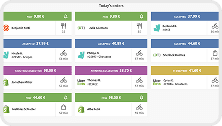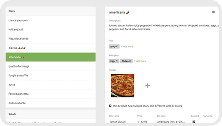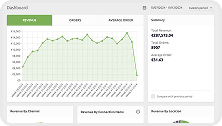API Reference
- home
- Developers
- API Reference
- Customers
Customers
1. Customer Lists
Like catalogs, customer lists exist at either location or account level.
Name uniqueness is ruled by the same constraints as catalogs:
- At the location level, customer lists are uniquely identified by their name.
- An account level customer list cannot have the same name as another account or location level customer list.
1.1. Retrieve Customer List
Returns a customer list.
Endpoint: | GET /customer_lists/:customer_list_id |
Access level: | Location, Account |
Example request:
GET /customer_lists/ag8u4
{ "id": "ag8u4", "name": "Online customers"}
1.2. List Customer Lists
Returns a location's Customer Lists. Includes location and account level Customer Lists.
Endpoint: | GET /locations/:location_id/customer_lists |
Short endpoint: | GET /location/customer_lists (location only) |
Access level: | Location, Account |
Paginated: | Yes (see pagination) |
Account level Customer Lists of an account:
Endpoint: | GET /accounts/:account_id/customer_lists |
Short endpoint: | GET /account/customer_lists (account only) |
Access level: | Account |
Paginated: | Yes (see pagination) |
Example request:
GET /locations/3r4s3-1/customer_lists
[ { "id": "apm3s", "name": "Online customers", "created_at": "2020-06-25T11:43:51+02:00" }, { "id": "s7ma5", "name": "POS customers", "created_at": "2020-05-19T13:23:10+02:00" }]
1.3. Create Customer List
Creates a new customer list.
To create a location-level customer list, use this request:
Endpoint: | POST /locations/:location_id/customer_lists |
Short endpoint: | POST /location/customer_lists (location only) |
Access level: | Location, Account |
To create an account-level customer list:
Endpoint: | POST /accounts/:account_id/customer_lists |
Short endpoint: | POST /account/customer_lists (account only) |
Access level: | Account |
Request parameters:
| Name | Type | Description |
|---|---|---|
name | string | The name of the customer list. |
Example request:
POST /locations/3r4s3-1/customer_lists
{ "name": "Web customers"}
If a customer list with the same name already exists, it returns an error.
1.4. Update Customer List
Update a customer list.
Endpoint: | PATCH /customer_lists/:id |
Access level: | Location, Account |
Example request:
PATCH /customer_lists/apm3s
{ "name": "New customers"}
If name is already used by another customer list, it returns an error.
1.5. Delete Customer List
Delete a customer list. Customers and loyalty cards belonging to the list are also deleted.
No event is fired in the process.
Endpoint: | DELETE /customer_lists/:id |
Access level: | Location, Account |
Example request:
DELETE /customer_lists/apm3s
2. Customers
2.1. Retrieve Customer
Returns a customer's details.
Endpoint: | GET /customer_lists/:customer_list_id/customers/:customer_id |
Access level: | Location, Account |
Example request:
GET /customer_lists/smpse3/customers/jdj9v
{ "id": "jdj9v", "customer_list_id": "smpse3", "anonymised": false, "private_ref": null, "email": "jimmy.watson@dummy-mail.org", "first_name": "Jimmy", "last_name": "Watson", "gender": "male", "birth_date": null, "created_at": "2020-01-18T17:12:02+02:00", "company_name": null, "phone": "+44123456789", "phone_access_code": "8888", "address_1": "1 Town Road", "address_2": null, "postal_code": "N9 0HL", "city": "London", "state": null, "country": "GB", "latitude": "45.7571206", "longitude": "4.8307575", "delivery_notes": null, "sms_marketing": false, "email_marketing": true, "nb_orders": 2, "order_total": "28.40 GBP", "first_order_date": "2020-01-18T17:15:11+02:00", "last_order_date": "2020-01-23T10:13:21+02:00", "loyalty_cards": [ { "id": "slp8q", "ref": null, "name": null, "balance": "13.5" } ], "custom_fields": {}}
2.2. List Customers
Returns customers belonging to a customer list. Filters can be specified.
Endpoint: | GET /customer_lists/:customer_list_id/customers |
Access level: | Location, Account |
Paginated: | Yes (see pagination) |
Request parameters:
| Name | Description |
|---|---|
private_ref | Returns customers having this private_ref. |
email | Filter customers by email. Wildcards (*) can be used. |
phone | Filter customers by phone. Wildcards (*) can be used. |
Example request:
GET /customer_lists/ag8u4/customers?phone=%2B44*
Note that the + character must be URL-encoded as %2B.
[ { "id": "asdf2", "customer_list_id": "ag8u4", "anonymised": false, "email": "charles.moore@dummy-mail.org", "first_name": "Charles", "last_name": "Moore", "phone": "+44123456789", ... }]
2.3. Create Customer
Creates a new customer.
There is no mandatory field so a customer can be created with no information then referred to by its unique id.
Endpoint: | POST /customer_lists/:customer_list_id/customers |
Access level: | Location, Account |
Request parameters:
| Name | Type | Description |
|---|---|---|
private_ref optional | string | The customer internal id, visible only to the client that set it. Typically used for customer lookup. Must be unique among the customer list if defined. |
email optional | string | Email. |
first_name optional | string | First name. |
last_name optional | string | Last name. |
gender optional | string | If defined, must be either male or female |
birth_date optional | date | Birth date in ISO 8601 format for dates, ie YYYY-MM-DD. |
company_name optional | string | Company name. |
phone optional | string | Phone number in E.164 format (*). |
phone_access_code optional | string | The access code to provide after calling the phone number above. Mostly used by food ordering platforms. |
address_1 optional | string | 1st line of address. |
address_2 optional | string | 2nd line of address. |
postal_code optional | string | Postal code. |
city optional | string | City. |
state optional | string | State. |
country optional | string | The two-letter country code as defined in ISO 3166-1 alpha-2. |
latitude optional | decimal | Latitude of the customer address. |
longitude optional | decimal | Longitude of the customer address. |
delivery_notes optional | string | Information provided by the customer to help with the delivery. |
sms_marketing optional | boolean | Whether the customer agrees to receive marketing messages via SMS. Defaults to false. |
email_marketing optional | boolean | Whether the customer agrees to receive marketing messages via email. Defaults to false. |
custom_fields optional | CustomFields | Additional data attached to the customer. |
(*) The E.164 format must be used for any new implementation. Be aware however that phone numbers retrieved from the API can be encoded in a different format. The E.164 will become mandatory in a future release.
Example request:
POST /customer_lists/ag8u4/customers
{ "private_ref": "2213312", "email": "charles.moore@dummy-mail.org", "first_name": "Charles", "last_name": "Moore", "gender": "male", "birth_date": "1999-01-01", "company_name": "HubRise", "phone": "+44123456789", "phone_access_code": "8888", "address_1": "1 avenue des Champs Elysées", "address_2": null, "postal_code": "75001", "city": "Paris", "state": null, "country": "FR", "latitude": "48.8589507", "longitude": "2.2770205"}
2.4. Update Customer
Updates a customer. Only the fields present in the request are updated.
Endpoint: | PATCH /customer_lists/:customer_list_id/customers/:customer_id |
Access level: | Location, Account |
Example request:
PATCH /customer_lists/ag8u4/customers/asdf2
{ "first_name": "Claude"}
2.5. Anonymise Customer
Deletes a customer's personal information.
Endpoint: | POST /customer_lists/:customer_list_id/customers/:customer_id/anonymise |
Access level: | Location, Account |
The anonymised fields are: email, first_name, last_name, gender, birth_date, company_name, phone, phone_access_code, address_1, address_2, postal_code, latitude, longitude, delivery_notes.
When a customer is anonymised, the anonymised fields retun a null value and the anonymised boolean field is set to true.
Anonymization cannot be reverted. Further updates of the anonymised fields will silently be ignored. The other fields (eg custom_fields) can still be updated though.
Anonymizing a customer also anonymises his/her orders. The customer resources of anonymised orders are modified in the same way as described above.
When a customer is anonymised, an Event with an update type is triggered for the customer and for each affected order.
Endpoint: | POST /customer_lists/:customer_list_id/customers/:customer_id/anonymise |
Access level: | Location, Account |
Example request:
POST /customer_lists/ag8u4/customers/asdf2/anonymise
3. Loyalty Cards
A customer can have zero, one or many loyalty cards. Each loyalty card defines:
- An optional
namewhich represents the marketing name of the loyalty scheme. - A
ref, which is unique for any given customer. - A
balanceof points.
A null ref can be used for no more than one of any customer's loyalty cards. A store running a single loyalty scheme would typically use loyalty cards with a null ref for each customer.
balance is updated automatically by HubRise when loyalty operations are created. This field cannot be changed directly.
3.1. Retrieve Loyalty Card
Returns a loyalty card.
Endpoint: | GET /customer_lists/:customer_list_id/loyalty_cards/:loyalty_card_id |
Access level: | Location, Account |
Example request:
GET /customer_lists/smpre3/loyalty_cards/slp8q
{ "id": "slp8q", "customer_id": "ve343", "name": "Come back!", "ref": "LOY", "balance": "13.5"}
3.2. List Loyalty Cards
Returns loyalty cards belonging to a customer list. Filters can be specified.
Endpoint: | GET /customer_lists/:customer_list_id/loyalty_cards |
Access level: | Location, Account |
Paginated: | Yes (see pagination) |
Request parameters:
| Name | Description |
|---|---|
customer_id | Return loyalty cards belonging to a customer. |
name | Filter loyalty cards by name. |
ref | Filter loyalty cards by ref. |
Example request: retrieve by ref
GET /customer_lists/smpre3/loyalty_cards?ref=LOY
[ { "id": "slp8q", "customer_id": "ve343", "name": "Come back!", "ref": "LOY", "balance": "13.5" }]
Example request: retrieve loyalty cards belonging to a customer
GET /customer_lists/smpre3/loyalty_cards?customer_id=ve343
[ { "id": "slp8q", "customer_id": "ve343", "name": null, "ref": null, "balance": "13.5" }, { "id": "65rsp", "customer_id": "ve343", "name": "Come back!", "ref": "LOY", "balance": "1.5" }]
3.3. Create Loyalty Card
Creates a new loyalty card for a customer.
Endpoint: | POST /customer_lists/:customer_list_id/loyalty_cards |
Access level: | Location, Account |
Request parameters:
| Name | Type | Description |
|---|---|---|
customer_id | string | The customer's id. Must exist or the request will fail. |
name optional | string | The marketing name of the loyalty scheme. |
ref | string | The loyalty card ref. Must be unique for any given customer. No more than one card per customer can have a null ref. |
Example request:
POST /customer_lists/smpre3/loyalty_cards
{ "customer_id": "ve343", "name": "Discounts for You", "ref": "DIS"}
If the request succeeds, a loyalty card is created with an initial balance set to "0.0".
3.4. Update Loyalty Card
Update a loyalty card.
Endpoint: | PATCH /customer_lists/:customer_list_id/loyalty_cards/:loyalty_card_id |
Access level: | Location, Account |
Request parameters:
| Name | Type | Description |
|---|---|---|
name optional | string | The loyalty card name. |
ref optional | string | The loyalty card unique ref. |
Example request:
PATCH /customer_lists/smpre3/loyalty_cards/slp8q
{ "ref": "LOYALTY"}
Note that only name and ref can be updated. It is not possible to change customer_id.
balance cannot be changed directly as well. To update the balance, create a loyalty operation.
4. Loyalty Operations
4.1. Retrieve Operation
Returns a loyalty card operation.
Endpoint: | GET /customer_lists/:customer_list_id/loyalty_cards/:loyalty_card_id/operations/:operation_id |
Access level: | Location, Account |
Example request:
GET /customer_lists/smpre3/loyalty_cards/slp8q/operations/22kmp
{ "id": "22kmp", "customer_id": "ve343", "created_at": "2020-01-18T12:37:21+02:00", "order_location_id": "psm98", "order_id": "mapcm", "reason": "Points earned on order", "delta": "4.2", "new_balance": "17.7"}
4.2. List Operations
Returns the operations on a given loyalty card, sorted by descending chronological order.
Endpoint: | GET /customer_lists/:customer_list_id/loyalty_cards/:loyalty_card_id/operations |
Access level: | Location, Account |
Paginated: | Yes (see pagination) |
Example request:
GET /customer_lists/smpre3/loyalty_cards/slp8q/operations
[ { "id": "22kmp", "customer_id": "ve343", "created_at": "2020-01-18T12:37:21+02:00" ... }, ...]
4.3. Create Operation
Create a loyalty card operation and updates the balance accordingly.
Endpoint: | POST /customer_lists/:customer_list_id/loyalty_cards/:loyalty_card_id/operations |
Access level: | Location, Account |
Request parameters:
| Name | Type | Description |
|---|---|---|
order_id optional | string | Attach this operation to a particular order. If defined, an order with this id must exist or the request will fail. An order can be attached to several operations. |
reason optional | string | Describes how the points were obtained/redeemed. The customer will typically see this field when he checks his loyalty account operations from a website. |
delta | decimal | The number of points to add to the customer balance. Use a negative number to remove points. |
Example request:
POST /customer_lists/smpre3/loyalty_cards/slp8q/operations
{ "order_id": "mapcm", "reason": "Points earned", "delta": "4.2"}
If the request succeeds, the operation's new_balance is automatically calculated, as well as the customer's balance.
A loyalty operation cannot be deleted or updated. To void a loyalty operation, create an opposite loyalty operation.


